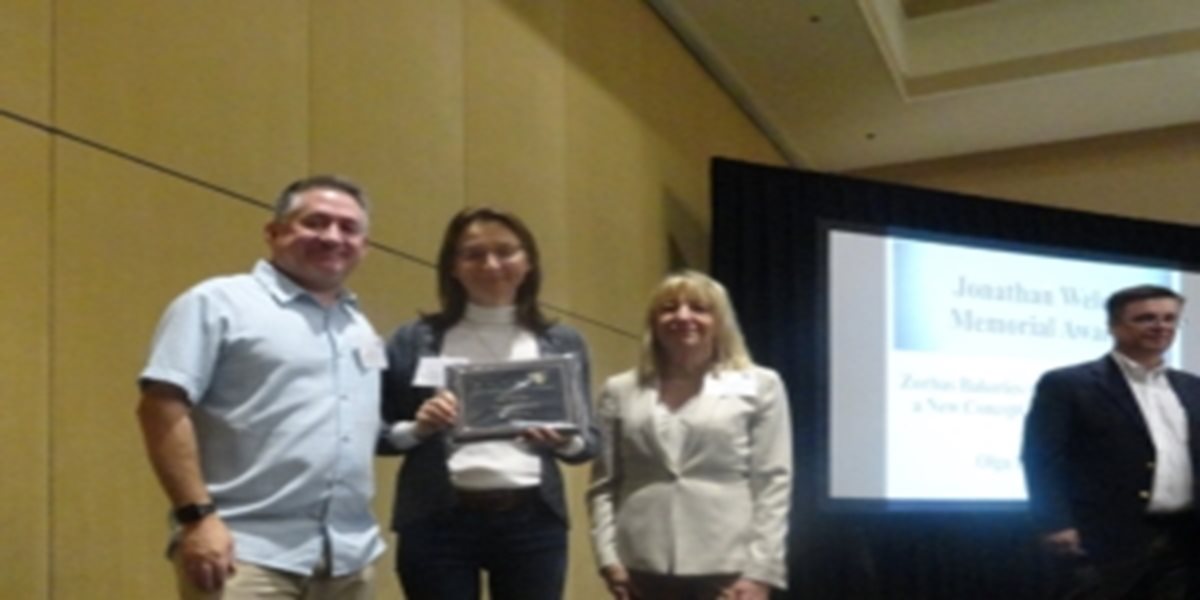
CIIM – Cyprus International Institute of Management is proud to announce that Dr Olga Kandinskaia, a full-time resident faculty at CIIM, has received a prestigious Johnathan Welch Award by NACRA for the business case she authored about the Cypriot company Zorbas Bakeries.
NACRA, North American Case Research Association, is the top global academic case research body, which holds the annual conference as the forum to present best business cases in different management disciplines. Dr Kandinskaia presented her newly-written finance case about Zorbas Bakeries at the recent NACRA conference held October 4-6, 2018, in Orlando, USA, and she won the Johnathan Welch Award, which NACRA grants every year for the Best Case in Accounting, Finance and Economics.
It is all the more important as it is the second time, in the last couple of years, that Olga is winning such an acclaimed award for a case about a Cypriot company going international. In 2017, Dr Kandinskaia won a top prize in the prestigious annual case writing competition organized by the Case Centre. Olga won in the competition ‘Outstanding New Case Writer’ with her case “Engino Toys: Staying in China or Moving to Europe?”. It was the first time that a business school or university from Cyprus was awarded a top prize in the international competition by the Case Centre.
NACRA: Premier Case Research Venue
NACRA https://www.nacra.net/ is a collaborative organization of approximately 500 researchers, case writers and teachers in the business disciplines. NACRA’s Case Research Journal (CRJ), the premier journal for teaching cases grounded in research, publishes outstanding field-research-based, decision-focused teaching cases drawn from research in real organizations. For cases, the impact from publication can be assessed from the distribution reach of the journal and the adoption of cases for classroom use. The CRJ has the broadest distribution of any peer-reviewed case journal. Their cases are distributed through Harvard Business School Press, Ivey Publishing, The Case Centre, Pearson Collections, McGraw Hill Create, StudyNet, and CCMP. Annually, there are over 50,000 adoptions of CRJ cases through their distribution partners.
It is the first time that a business school or university from Cyprus has received an award by NACRA.
Winning Case: Zorbas Bakeries
Olga’s winning case is about a new project in New York undertaken by the local Zorbas Group.
What is the story in the case? As Olga explained, “the case presents a decision situation. The case setting is Nicosia (Cyprus), December 2014. Zorbas Bakeries, a large family-owned Cypriot company, was considering at that time a new strategic initiative: open a new concept store abroad in a major big city, such as New York. Moreover, it wasn’t just about opening one shop, but the shop that would be used as the pattern for the future international franchise stores. Such a project would be most unorthodox for a Cypriot family-owned company and involve multiple risks. The Managing Director of the company Demetris Zorbas was assigned responsibility for this project.”
What are the learning outcomes? As Olga noted, “this case is ideal to expose MBA and MSc students to a wide range of issues related to the strategic investment decision process covered within the Corporate Finance course or similar. The students are taken step-by-step through a financial modeling exercise in Excel, which allows them to acquire both theoretical knowledge and practical skills. This case highlights that the standard Net Present Value analysis does not take into account the flexibility inherent in the capital budgeting process, and in some cases such flexibility becomes very important and in fact may even change the decision. What flexibility do we mean? In real life, managers may have flexibility embedded in the following options: an option to delay, an option to expand, and an option to abandon. In other words, in the situations of uncertainty and when managers have the chance to learn from the first try and adapt their future behavior, the project resembles a classical option, i.e. an opportunity but not an obligation to go ahead (or not go ahead). This is what they call ‘real option’ in finance.”